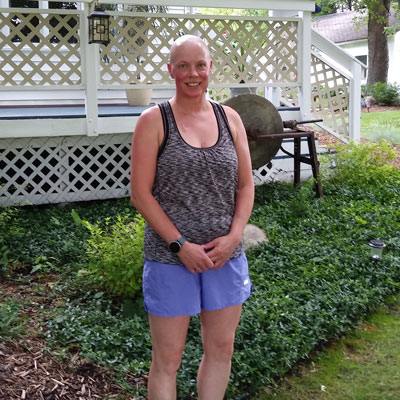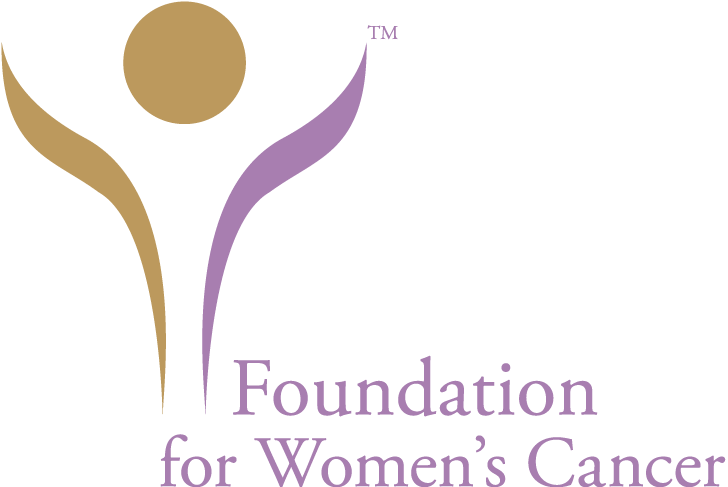Giving Back After a Recurrence of Endometrial Cancer

Valerie Parker
Valerie Parker, 45, has a lot to be thankful for this summer, in spite of having surgery for a recurrence of endometrial cancer in the midst of the COVID-19 pandemic. During her recovery she was the inspiration for a recycling campaign in Weston, WI, by a Wisconsin-based startup, Betterbin, which donated the proceeds of their new initiative to the Foundation for Women’s Cancer (FWC) in her honor. And last month, she rang the bell at the hospital where she received treatment to signal that the cancer was now in remission.
Valerie was initially diagnosed with endometrial cancer in March 2018. She pressed her medical team to schedule a total hysterectomy right away, and after her uterus, cervix, fallopian tubes and ovaries were removed, Valerie was told that she did not require additional treatment but needed regular follow-up examinations. Throughout 2019, Valerie experienced pelvic pain and unusual sensations that were thought to be complications with her intestines and constipation. It wasn’t until she experienced vaginal bleeding in the beginning of December that she knew these symptoms were a sign of something else.
In December 2019, Valerie was diagnosed with a recurrence of endometrial cancer. “Strangely, it was almost a relief to get the news,” she said. “I was upset initially, but I figured if I beat it once, I could beat it again.”
She started receiving treatments of carboplatin and paclitaxel shortly after the recurrence—three chemotherapy sessions that were three weeks apart. After her oncologist noted that her tumors had shrunk significantly, Valerie underwent laparoscopy surgery, during which a small viewing tube was inserted through the abdomen to look directly at the large tumor located at her vaginal cuff, along with other tumors that had been found through a PET scan.
Valerie’s gynecologic cancer care team determined that the most effective procedure to remove her tumors was an open surgery with Hyperthermic Intraperitoneal Chemoperfusion (HIPEC), a procedure in which a warmed solution containing anticancer drugs is used to bathe the tissue or organ containing the tumor.
Valerie was set to have surgery on March 20, 2020, to remove the tumors, followed by another three rounds of chemotherapy with the hope of diminishing the cancer entirely.
“The week leading up to my surgery, the hospital (Marshfield Medical Center in Marshfield, WI) announced that they were not doing any elective surgeries,” said Valerie. “I was so relieved when I learned my surgery would not be postponed, that we were staying on schedule. The day of my surgery, only my husband Matt was able to come with me.”
Immediately following her surgery, Valerie was brought to the Intensive Care Unit (ICU), so she was not able to see her husband.
“The next day was when the hospital put in a temporary order that no visitors were allowed,” Valerie recalled. “I was in the hospital for 15 days, and the entire time communicated with family by phone, e-mail, Facebook and through video calls. It was difficult not being able to have visitors, but we made the best of it.”
During this time, Michelle Goetsch, a friend and colleague of Valerie’s who is the co-founder of Betterbin, began to work on a recycling campaign in Weston with the proceeds going back to FWC.
“Given Valerie’s occupation as a village planning technician and recycling coordinator, the goal of our donation campaign was to help her residents learn more about recycling right,” Michelle explained. “We had launched the Betterbin app in her community, and asked residents to use the app to scan UPC barcodes of products to get local recycling instructions. We ran the challenge from March 1- April 22 (Earth Day).”
For each scan, Betterbin associated a monetary amount, and after about 300 product scans, Betterbin had collected and donated $75 to FWC on Valerie’s behalf.
“While the donation might be small, it was truly meaningful for us to make a contribution to women’s cancer research on Valerie’s behalf,” Michelle wrote in her letter to the Foundation. “Valerie went above-and-beyond to support our work as a new startup, and we couldn’t have gotten to where we are without her willingness to go the extra mile in her work as a recycling educator.”
Valerie’s willingness to “go the extra mile” extends to her commitment to share her story and give advice to other people who have been impacted by gynecologic cancers.
“Stay positive and optimistic,” said Valerie. “Push your medical team to work quickly and trust the medical technologies that are available. Don’t hide from family and friends about your cancer. It does help to get all the love and support possible from your family and friends. Lastly, stay active!”
